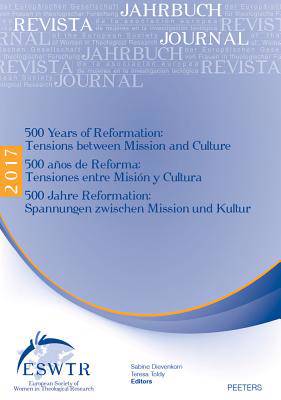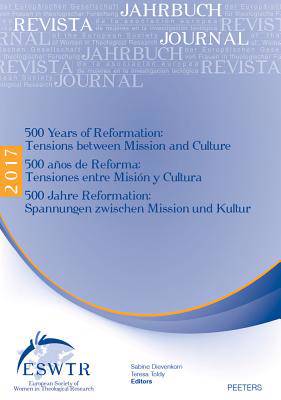
- Retrait gratuit dans votre magasin Club
- 7.000.000 titres dans notre catalogue
- Payer en toute sécurité
- Toujours un magasin près de chez vous
- Retrait gratuit dans votre magasin Club
- 7.000.0000 titres dans notre catalogue
- Payer en toute sécurité
- Toujours un magasin près de chez vous
500 Years of Reformation: Tensions between Mission and Culture - 500 años de Reforma: Las tensiones entre Misión y Cultura - 500 Jahre Reformation: Spannungen zwischen Mission und Kultur
Livre broché | Multilingue | Journal of the European Society of Women in Theological Research | n° 25
50,00 €
+ 100 points
Description
The Reformation has a far-reaching missionary dimension. Martin Luther, with his translation of the Bible, had not only contributed to the transcription of the German language. He initiated a theological process of translation and transculturation of the Bible. Patriarchally-coined cultural-historical and socio-political contexts have undergone a theological evaluation and have had a great effect in the history of political mission. The woman, ambivalently seen as the witch, the whore and the saint, is reduced into a Protestant serving-body in the patriarchal reference system. In the tension between exegesis and eisegesis, the Protestant-becoming monk transferred the Bible into the everyday language of the German Middle Ages. As an agency-oriented mediator--to use current day terminology--he inscribed, in his translation, his theology of Reformation. Oscillating between author and reader, source and target text, he gave the biblical word the interpretation that he regarded as politically correct and theologically viable. The so-reformed Bible was an innovation for patriarchal European theology and science, facilitating male progress in the form of individualism and national democracies and states. Protesting Catholic women theologians and Protestant-becoming nuns had no historical opportunity. With the termination of monastic life in the Protestant Church, formal life options and education possibilities for women had become restricted. That women could raise their voices as theologians only 500 years after Reformation is due not least to the fact that the Reformation was not able to produce female evangelical theologians, nor had it wanted to, nor could it do so. This would change only with the transformation in universities' politics in the 20th century.
Spécifications
Parties prenantes
- Editeur:
Contenu
- Nombre de pages :
- 225
- Langue:
- Multilingue
- Collection :
- Tome:
- n° 25
Caractéristiques
- EAN:
- 9789042935518
- Date de parution :
- 11-12-17
- Format:
- Livre broché
- Format numérique:
- Trade paperback (VS)
- Dimensions :
- 150 mm x 210 mm
- Poids :
- 317 g

Les avis
Nous publions uniquement les avis qui respectent les conditions requises. Consultez nos conditions pour les avis.





